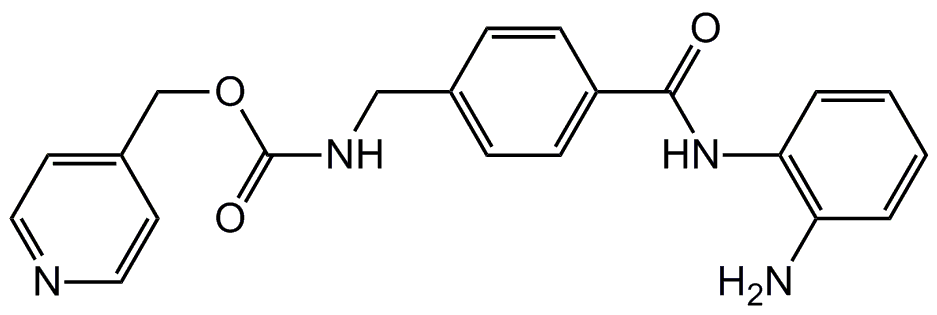
Chemical Structure
MS-275 [209783-80-2]

AG-CR1-0032
Overview
- SupplierAdipoGen Life Sciences
- Product NameMS-275 [209783-80-2]
- Delivery Days Customer10
- CAS Number209783-80-2
- CertificationResearch Use Only
- Estimated Purity>99%
- Molecular FormulaC21H20N4O3
- Molecular Weight376.4
- Scientific DescriptionChemical. CAS: 209783-80-2. Formula: C21H20N4O3. MW: 376.4. HDAC 1 inhibitor. Antitumor compound. Antiproliferative. TGF-beta type II receptor inducer. Apoptosis inducer. Anti-inflammatory. Angiogenesis inhibitor. Review. Promotes either self-renewal or differentiation of embryonic stem cells. - HDAC 1 inhibitor [1, 2]. Antitumor compound [1-3]. Antiproliferative [2]. TGF-beta type II receptor inducer [2]. Apoptosis inducer [4]. Anti-inflammatory [5]. Angiogenesis inhibitor [6]. Review [7]. Promotes either self-renewal or differentiation of embryonic stem cells [8].
- SMILESNC1=C(NC(=O)C2=CC=C(CNC(=O)OCC3=CC=NC=C3)C=C2)C=CC=C1
- Storage Instruction-20°C,2°C to 8°C
- UNSPSC12352200
References
- A synthetic inhibitor of histone deacetylase, MS-27-275, with marked in vivo antitumor activity against human tumors: A. Saito, et al.; PNAS 96, 4592 (1999)
- MS-275, a histone deacetylase inhibitor, selectively induces transforming growth factor beta type II receptor expression in human breast cancer cells: B.I. Lee, et al.; Cancer Res. 61, 931 (2001)
- MS-27-275, an inhibitor of histone deacetylase, has marked in vitro and in vivo antitumor activity against pediatric solid tumors: J. Jaboin, et al.; Cancer Res. 62, 6108 (2002)
- The histone deacetylase inhibitor MS-275 promotes differentiation or apoptosis in human leukemia cells through a process regulated by generation of reactive oxygen species and induction of p21CIP1/WAF1 1: R.R. Rosato, et al.; Cancer Res. 63, 3637 (2003)
- MS-275, an histone deacetylase inhibitor, reduces the inflammatory reaction in rat experimental autoimmune neuritis: Z.Y. Zhang, et al.; Neuroscience 169, 370 (2010)
- S-275 sensitizes TRAIL-resistant breast cancer cells, inhibits angiogenesis and metastasis, and reverses epithelial-mesenchymal transition in vivo: R.K. Srivastava, et al.; Mol. Cancer Ther. 9, 3254 (2010)
- MS-275, a potent orally available inhibitor of histone deacetylases--the development of an anticancer agent: H. Hess-Stumpp, et al.; Int. J. Biochem. Cell Biol. 39, 1388 (2007)
- Histone Deacetylase Inhibitors in Cell Pluripotency, Differentiation, and Reprogramming: A. Kretsovali, et al.; Stem Cells Int. 2012, 1 (2012)
